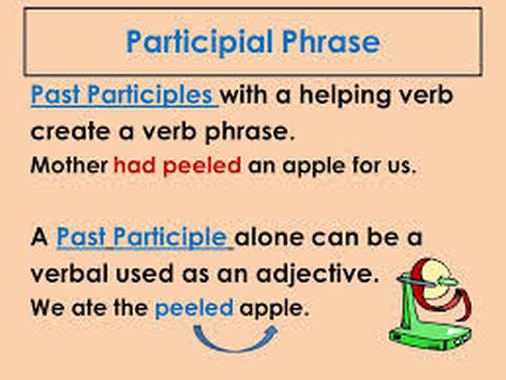This is the 15th in a series of 20 essays on what I consider as the most annoying English grammar errors. It is running consecutively here in the Forum from November 7, 2017 every Tuesday and Friday until January 5, 2018.7 – The misuse of participles and participial phrases (2)We will now discuss the three other ways that participles can be annoyingly misused, namely (2) wrongly using the past tense instead of the past participle in a verb phrase, (3) wrongly using the past participle instead of the past tense for the predicate of a clause, and (4) making the participle or participial phrase dangle in a sentence.

The second and third kinds of participle misuse happen quite often for two major reasons. First, many English verbs inflect for the past tense in irregular ways, such as “be” inflecting to “was” and “go” inflecting to “went.” Second, English verbs inflect for the past participle by taking one of at least eight suffixes: “-ed” (“shock” to “shocked”), “-d” (“shave” to “shaved”), “-en” (“fall” to “fallen”), “-t” (“deal” to “dealt”), “-n” (“see” to “seen”), “-um” (“swim” to “swum”), “-un” (“begin” to “begun”), and “-ft” (“leave” to “left”), or not at all (“set” to “set”). So, unless we are thoroughly familiar with all of these inflections, we are likely to mistake the past-tense form for the past-participle form every so often.
1. Most common instances of misuse of the past tense instead of the past participle:(a) Wrong form of the past perfect: “The show
had began by the time we arrived.” The correct form to use is the past participle “begun,” not the past tense “began”: “The show
had begun by the time we arrived.”
(b) Wrong form of the past modal perfect: “We
could have went home right away.” The correct form to use is the past participle “gone,” not the past tense “went”: “We
could have gone home right away.”
We can avoid using the wrong form of the past perfect by always keeping in mind that in the perfect tenses, the operative verb always takes the past participle form. And in the perfect tenses, it is the auxiliary verb that takes the tense: “has”/“have” for the present perfect, “had” for the past perfect, and “will have” for the future perfect.
For the past modal perfect, depending on the likelihood or type of conditionality, the correct form is as follows: “could”/“must”/“might”/“would” + have + past participle of the operative verb.” Here are three examples of this usage: “You
could have won had you played.” They
must have met sometime last month.” “We
would have jogged if not for the heavy rain.”
2. Most recurrent misuses of the past participle for the predicate of a clause:(a) Wrong use of the past participle “drunk”: “We
drunk too much champagne last night.” Correct using the past tense “drank”: “We
drank too much champagne last night.”
(b) Wrong use of the past participle “gone”: “They
gone home right away.” Correct using the past tense “went”: “They
went home right away.”
In such sentence constructions, we should consistently use the past tense, not the past participle, for the predicate of the clause.
3. Dangling participles or participial phrases:A participle or participial phrase dangles when it fails to effect or achieve a semantic interlock with the grammatical element it’s supposed to modify, as in the following example from a newspaper story: “
Wanted for killing of leftists in her home country, Spain arrests (the) widow of Juan Peron and former president of Argentina, Isabel Peron, now 75.”
By simple inspection, we find that the real subject of the sentence is “Isabel Peron,” not “Spain,” and that the frontline participial phrase “wanted for killing of leftists in her home country” should modify “Isabel Peron” and not “Spain.” In short, that phrase is a dangling modifying phrase.
The general rule for avoiding dangling modifying phrases is to position it as close as possible to the word or grammatical element it is intended to modify, as has been done in the following major reconstruction of the problematic sentence: “
Wanted for killing of leftists in her home country, Isabel Peron, 75, widow of Juan Peron and the former president of Argentina, is arrested in Spain.”
(Next:
Misuse of prepositional phrases and prepositional idioms – 2) December 26, 2017
This essay, 15th in a series of 20, first appeared in the column “English Plain and Simple” by Jose A. Carillo in the November 4, 2007 issue of The Manila Times. It subsequently formed part of the book The 10 Most Annoying English Grammar Errors
, ©2008 by the author, © 2009 by the Manila Times Publishing Corp. All rights reserved.